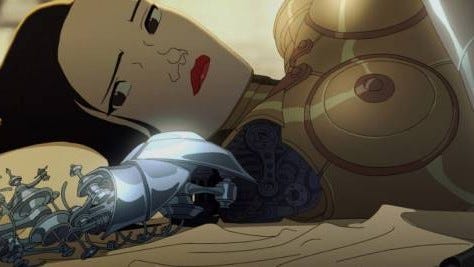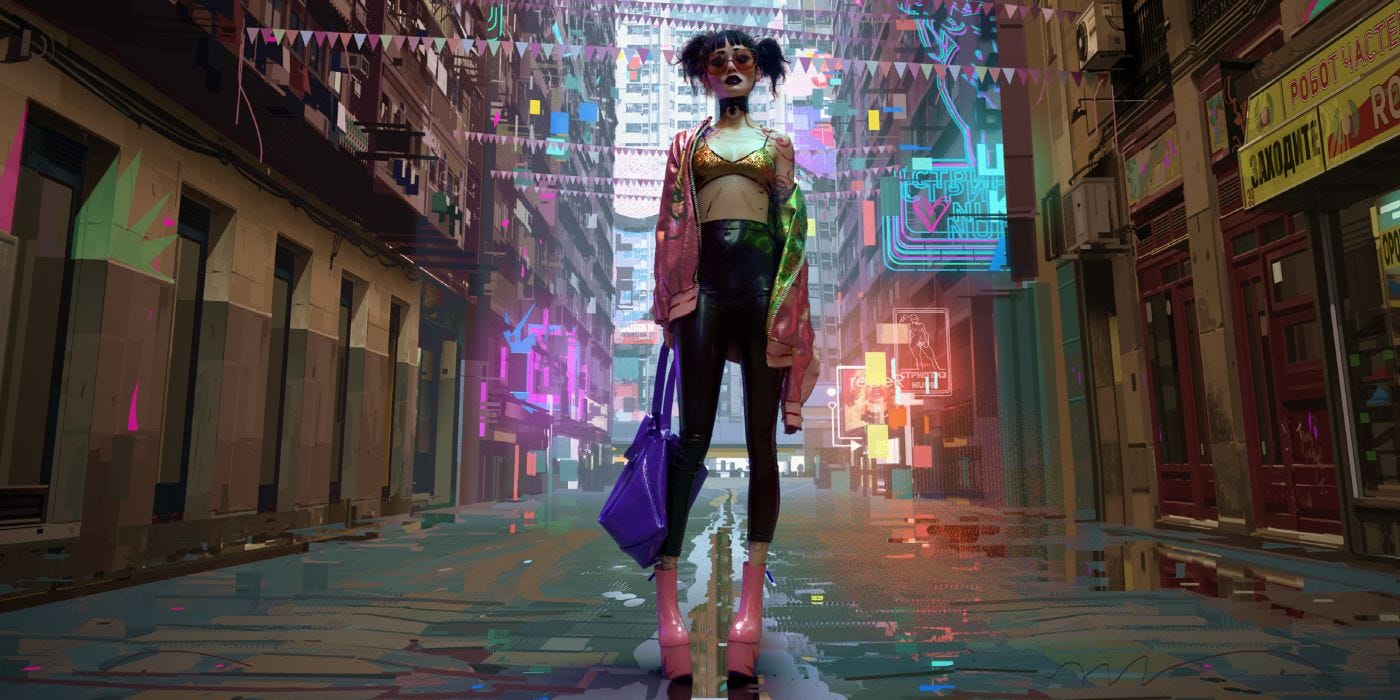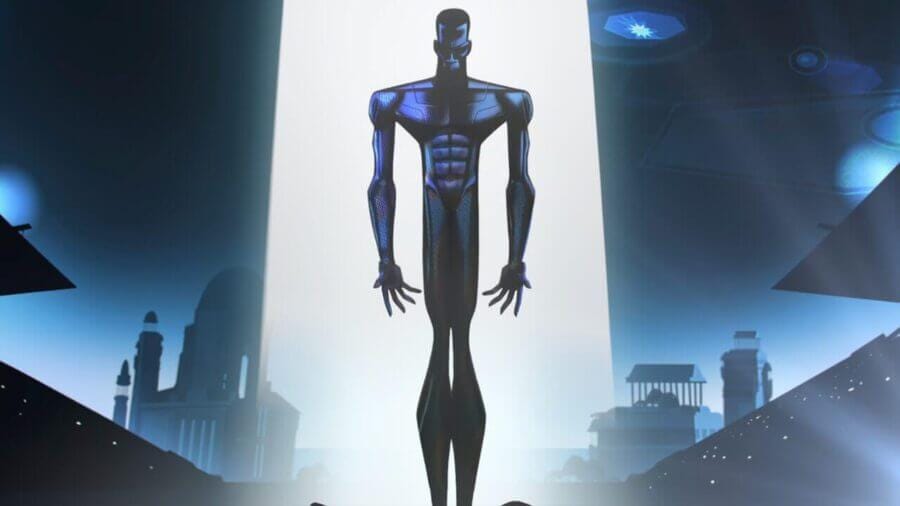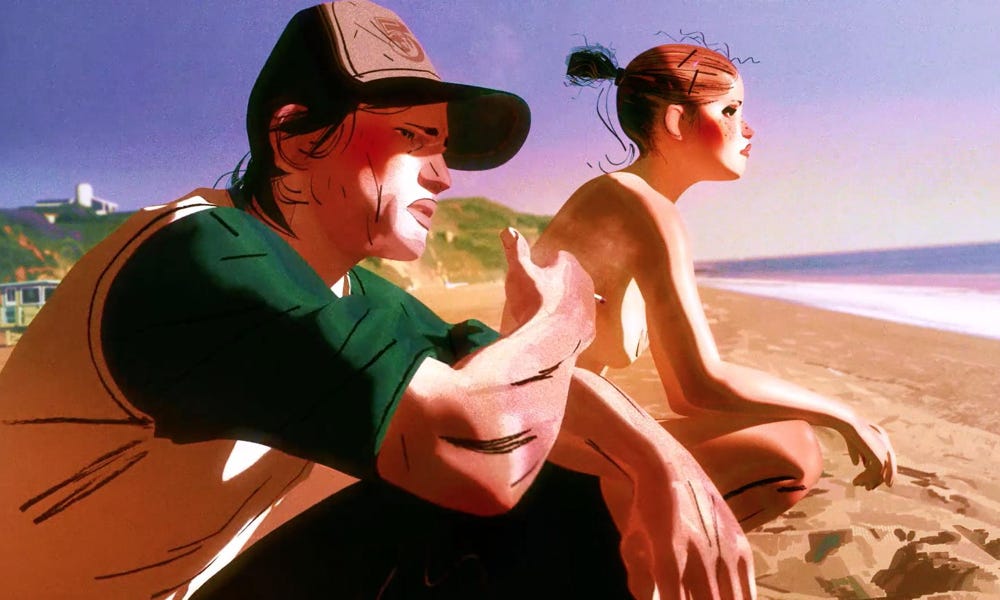Love Death + Robots is a Netflix anthology series that showcases a variety of stories and animation styles with the general theme of… well; love, death, and robots. The premise of the series is engaging, similar to Black Mirror, being a compilation of short films following an overarching concept, with the added appeal of using animation to help push the story. What results is a mosaic of art and stories with genuinely some of the coolest visuals I've ever seen.
I watched the first season when it came out and I was blown away by the episodes “The Witness” and “Zima Blue”. Yet by the time season 2 came out, I wasn't exactly enticed to come back. The majority of season 1’s episodes were frankly mid to unappealing with a lack of strong artistic direction that didn't even make it interesting to look at, unless it's to be impressed by the technical skills of animation (which are worth their flowers). I did consider just watching the episodes that has the same directors as The Witness and Zima Blue because of their art style but then I realized, was it the stories that I liked or was it just the visuals?
I still think Zima Blue is genuinely an enjoyable story on top of the beautiful art style by Robert Valley (who we will get back to). However, The Witness… not so much. I was highly anticipating one of the directors of The Witness, Alberto Mieglo’s, own independent short film, The Windshield Wiper, after discovering him through Love Death + Robots (and also learning he was the mind behind Sony’s The Spiderverse's art direction that Sony screwed him over on) but I would end up raising an eyebrow to it. Don't get me wrong, it's a stunning piece, exhibiting Mieglo’s amazing art style and eye for cinematography. However, I couldn't help but feel a type of way in how the women were shown throughout the film. Although not nearly as egregious as I've seen other works do (including within Love Death + Robot), the women are still noticeably more sexualized than the men. A particular story stood out to me where a man looks out to the ocean shore and a woman—much more youthful and attractive than him—joins him butt naked. Why is she the only one naked? Why did the guy take the time to put on what looks like two layers of clothes and an accessory? Did we only think about the sexy carefree demeanor of the woman who would casually remain naked in broad daylight while the man remains a generic empty slate?
The Witness is a story of a young woman accidentally witnessing a murder. She is spotted by the murderer and starts to run with him on toe. In the midst of a life threatening chase, the woman stumbles into a sex parlor. The man hunting her barges in but ends up getting caught up in the sexual menagerie. Meanwhile, the woman gets dressed and goes on stage to do a steamy burlesque number before the two spot eachother again. Wait… what? What happened to the chase?? It turns out this is actually the woman's work place and I guess we had to take a time out from escaping murder to punch in and do a sexy dance scene. I have to ask, why was that scene there at all? Knowing she does sex work doesn't actually tell me who she is as a person. When I saw the trailer for season 3 and saw a sneak peek of Jibaro, with the woman seductively dancing out of the water, I understood the pattern in his work. Just looking at Alberto Mieglo's Instagram as well as his fellow director for The Witness, Gabriele Pennacchioli’s, it's apparent how both aren't just subliminal about their sexualization of women's bodies. The following pictures are the most recent posts from both directors where tits and half dressed women are abundant.
Also I stumbled upon Alberto posting life drawings of lesbian porn??? Sir… have some shame.
When I saw The Windshield Wiper, I noticed how despite it depicting a variety of love stories, it was predominantly heteronormative. Of course I don't expect Alberto to navigate queer romance as a presumably straight man but then it does feel exclusionary when the short film itself set out to portray diverse stories of love. This essay isn't just to chew up Alberto though but to dissect the type of stories and tropes that Love Death + Robots tends to favour. Just reminiscing on the first season, the series overall centers a White male perspective, with one or two East Asian focused stories (which unsurprisingly sexualizes East Asian women). Even the stories with female leads are clearly written by men or with men in mind, including with the sapphic characters (there also hasn't been any gay masc representation yet).
I got to attend a premiere of season 4 of Love Death + Robots with a Q&A session with Robert Valley and Tim Miller. We got to watch 6 episodes ahead of the upcoming season and… I have thoughts. A bare bones summary of the episodes I got to see is the following:
Fighting giant evil babies
Naked White lady in space who adopts an alien baby
Naked East Asian lady fighting on top of dinosaurs with a Mr. Beast cameo (?!)
Believing in God
Americans fighting off an alien invasion (there's a joke about a man leaving a sex shop with bags of newly bought dildos excitedly begging to be beamed up and probed so I guess that's our gay masc representation)
A Red Hot Chili Peppers concert performance as bobble heads
It shouldn't really be a surprise that I only ended up liking one of the episodes (400 Boys, the giant baby monsters one, also directed by Robert Valley). Although I was already aware of the Whiteness and maleness of Love Death + Robots, seeing it now with a better sense of socio-political awareness made this much more of a drag in comparison to when I first discovered the series. It becomes hard to isolate conservative aspects from the overall story when it seems to be just as much as a thematic element as the love, death, and robots are. It made it that I can't even look at something as crude and absurd as the miniature alien invasion without feeling like there was a connection being made between American patriotism and xenophobia.
After we wrapped up the episodes, the Q&A took place and although I don't want to caricaturize the directors over this singular moment… it was a rough experience. Tim Miller started apologizing for being American but then used the “R word” to insult Trump. While Robert Valley was answering a question, unprompted, he brought up how a coworker raised concern over his female character designs in 400 Boys and said it was “weird” because “what about mutilating giant monster babies?” As if it’s hypocritical to be bothered about the objectification of women and not the fantastical gore. Although I get Robert felt a bit attacked, he wasn't just dismissive of a concern but judgemental about it, bringing it up randomly to a room of presumably Love Death + Robots fans to validate his denial of the problem.
I was also a bit surprised to see that Robert Valley is White when Zima Blue and 400 Boys center Black leads. It's not necessarily that a non-Black person can't work on stories centering Black characters but those episodes are one of very few episodes of the entire series that follow Black leads, which would make me hope that Black creatives were the ones who got to handle those projects.
The Q&A doesn't get better as when Robert was stumped on a question about how he goes about story telling, Tim Miller joked “don't worry about being politically correct.”
… Huh? Why would that even be a concern when the question has nothing to do with political values?? How was this the second time these directors, UNPROMPTED, took a jab at “the woke” when no one was bringing it up??? I ended up getting the impression that Love Death + Robots didn't just fail to consider marginalized voices in an anthology series that would've been prime to showcase a wide variety of perspectives, but actively shunned it since Tim Miller seems to cringe at the idea of being “politically correct”. The closest we can get to a “diverse” story is a sapphic lead and that unfortunately feels more like fan service for men than an actual effort to portray queerness. This aligns with the overall red-neck vibe of Love Death + Robots where even the stories I found to be exceptionally better than the rest still had a director who couldn't handle being told his female character designs might not be the most tasteful. Love Death + Robots is filled with sexualized women from half dressed to butt naked, even more than it has female characters that aren’t. Any Black woman is just a side character and any East Asian woman is prostituted in some way, with no representation of other racialized women (and men). Even acknowledging this would be frowned upon by the series who do not welcome a socio-political lens.
Even though Timmer Miller says he can weed out the “objectively bad” stories (in his words during Q&A) from Love Death + Robots, that didn't seem to prevent an entire episode being a Red Hot Chilli Peppers music video with hideous bobble heads and a Mr. Beast episode that was purely sensory stimuli of violence, naked people, and dinosaurs to make the cut. If those could make it into the series, then how has a story from a more marginalized perspective not been able to? It couldn't be that every one of them are actually worse than the above examples. Yet to even point that out, I feel like would test Tim’s patience as you're just not meant to want more out of Love Death + Robot. Even when they wave their hand at “political correctness”, they don't seem to turn their nose at a religious themed episode, at least when it’s Christianity. Would Tim be as willing to pick up a story if it centered minority religions or stories that criticizes the practice of religion altogether? Would that veer into “political correctness” despite Christianity being unapologetically preached in How Zeke Got Religion? Would Tim find an episode with a male queer lead too “politically correct” or would it be okay as long as it doesn't actually explore the politics of being queer? The thing is, despite not wanting to politicize their series, Love Death + Robots is willing to house conservative ideologies.
If I'm to give benefit of the doubt, Tim isn't trying to push conservatism onto viewers but that this is just his lifestyle and he can't perceive it as political. Wokeness is misunderstood as “politicizing the non-political” where conservatives see themselves as apolitical. That doesn't take away from the single-mindedness of Love Death + Robots though that embraces conservatism as the norm if not celebrating it as American culture and hardly willing represent experiences outside straight White cisgender men (ruh-roh the infamous buzzwords). Love Death + Robots is genuinely a really cool idea with a creative premise that can and has produced cool stories. Even better is how it becomes a perfect display of animation styles and artistic directions, highlighting the magic of combining story telling with animation. The Netflix series has great potential if it's willing to broaden its horizons yet is currently stifled by the arrogance of White men and their prejudices towards political correctness.









